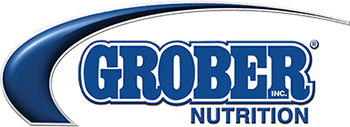The Pressure’s On – Prudent Antibiotic Use on-Farm
- Apr 03, 2017
- By Grober Nutrition
- In Canada, USA
Antibiotics are a useful tool on the farm. Farmers continue to practice responsible antibiotic use when an animal becomes sick and needs to be cared for and treated. Both human and animal medicine are experiencing challenges of certain antibiotic resistances, lending to changes in rules and regulations – a post antibiotic era is a real possibility.
As part of our responsibility on-farm, being proactive, by reducing the need coupled with prudent use of antibiotics are the most effective management approaches. How can you reduce the need for antibiotics with your calves?
HOUSING
Housing management can be broken down into 3 pillars when it comes to disease causing agents: stocking density, bedding, and ventilation. These three interlacing factors can have a compounding effect on the likelihood of a calf contracting and passing on an illness. Keeping the environment clean will reduce the immunological pressure on calves. Washing feeding equipment with soap and water is a simple and easy way to effectively disinfectant. General cleanliness decreases pathogen load.
NUTRITION
Proper nutrition leads to healthy gains and strong immunity, and an optimized calf nutrition program starts with COLOSTRUM! Review the nutritional needs of your calves with your veterinarian, feed dealer, and nutritionist to structure the best nutritional fit for your herd. Determine the protein/fat ratio needed and the right feeding program for healthy gain. Remember, not all milk replacers are created equal.
ANTIBIOTIC ALTERNATIVES
There are many, many, special ingredients, and even nutritional strategies, available to help maintain good calf health, and mitigate severity of disease symptoms. These products range from plant essential oils, yeast cell wall components, pro-biotics, organic osmolytes, acidification, optimization of fatty acid profiles in milk replacers … These ingredients are tools, and still must be paired with good management, along with good judgement of available research evaluating their effectiveness.
Products that are customized for livestock immunity challenges such as hyperimmunized eggs contain natural antibodies against specific antigen groups. Research trials have shown this natural option as an effective tool to reduce severity of scours and related treatments.
TOP TIPS
Using antibiotics appropriately and responsibly is essential for continued efficacy. Here are some guidelines for responsible use of antibiotics on-farm:
The 3 R’s:
- Right drug for symptoms of illness
- Right dose and duration
- Right time (stage of symptoms – don’t wait until it’s too late!)
Know what you’re treating for and keep records to track seasonal changes of drug use, morbidity (disease symptoms) and mortality
- Create permanent treatment records; not just a scrap piece of paper or chalkboard
- Capture the calf ID, date, drug, dose, & reason for treatment
Staff training and awareness. Ask yourself the following:
- Do you have enough barn staff to allow time for calf observation?
- Is everyone trained in the same way and following the same treatment protocols?
- Does everyone define a sick calf in the same way?
- Do you have a calf health checklist for assessing attitude, nasal and eye discharge, cough/heavy breathing, ear droop, scours?
Record and review on-farm protocols with your staff and veterinarian then ask yourself:
- Are the protocols feasible to implement??
- Are they being followed?
- Is the system working, breaking, or broken?
Create a pro-calf environment – if you aren’t comfortable in the calf barn, are your calves?
There is growing pressure in Canadian agricultural to reduce the use of antibiotics. Proactive efforts on-farm with cleaner housing and proper nutrition will improve calf health. Actively seeking out antibiotic alternatives to prevent illness will have you one step ahead should the control of antibiotic use become more stringent.















